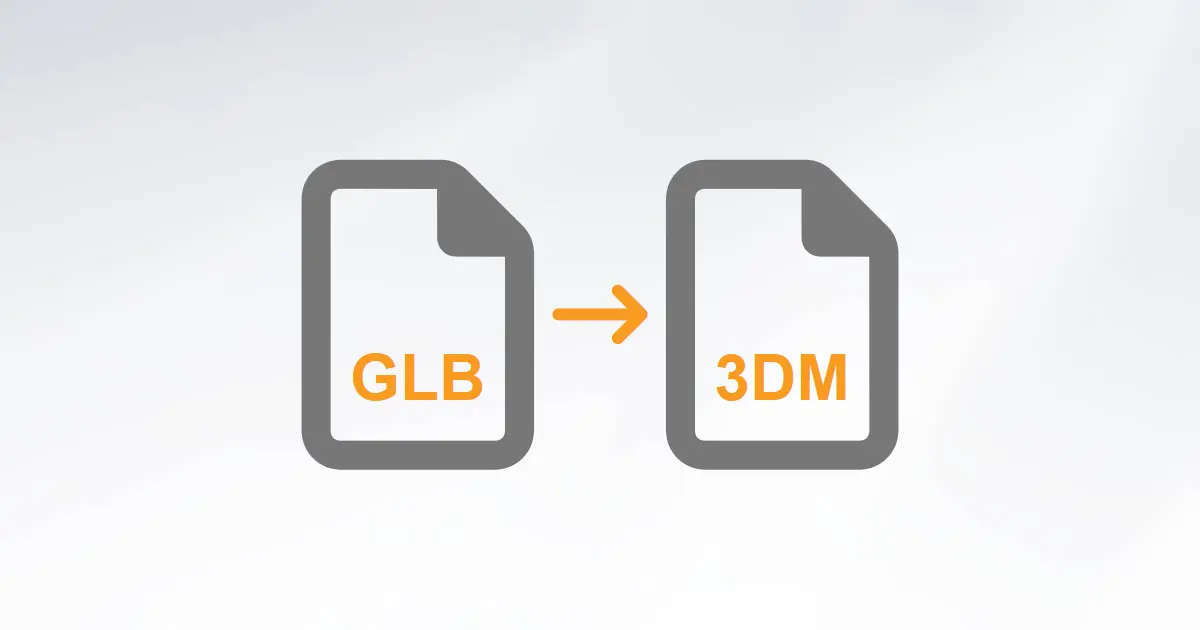
GLTF to 3DM Conversion
Our step-by-step tutorial makes converting GLTF to 3DM quick and effortless:
Install Autoconverter
Download and install Autoconverter on your system. Launch the software to convert GLTF files to 3DM format.
Import GLTF File
Click Open... to load your GLTF (.gltf, .glb) file, or drag and drop it into the application window.
Export to 3DM Format
Use Save As... to export your file to the 3DM file format (.3dm).
Still struggling to convert GLTF to 3DM? Our reliable guides help you handle GLTF files with ease:
- How to Convert 3D Mesh Files Using Command Line
- Autoconverter Uses Vertex Normals to Display Smooth Meshes
- Batch Convert 3D Mesh Files with Autoconverter (STEP, STL, OBJ & More)
- Convert Smooth Edges in SketchUp SKP Files
GLTF and GLB 3D File Format
The GLTF (GL Transmission Format) and GLB file types are modern open standards developed by the Khronos Group for efficient storage, transmission, and rendering of 3D models. Designed for the web, gaming, VR/AR, and real-time applications, these formats enable compact, high-performance 3D asset workflows across platforms.
Key Features of GLTF and GLB Files
- GLTF Versions:
- GLTF 1.0: Supports basic geometry, textures, simple materials, and skeletal animations with joint hierarchies.
- GLTF 2.0: Adds advanced features like PBR (Physically Based Rendering) materials, Draco compression, morph targets, skinning, and enhanced animation capabilities.
- ASCII vs Binary: GLTF files are human-readable (JSON format), while GLB files combine 3D data, textures, and materials into a compact, binary format for faster loading and easier distribution.
- Embedded Textures: Both GLTF and GLB can embed textures directly, creating self-contained 3D assets ideal for web and mobile applications.
Convert GLTF and GLB Files
With Autoconverter and Automesher Application, you can easily import, export, and convert GLTF and GLB files to formats like OBJ, FBX, STL, and more. Our software supports Draco compression, enabling significantly smaller file sizes while preserving the quality and performance of your 3D assets.
Rhinoceros 3D (3DM) File Format
The 3DM file format is the native format for Rhinoceros 3D (Rhino), a leading NURBS-based 3D modeling software used across industries like architecture, engineering, and industrial design. 3DM files accurately store mathematical representations of curves, surfaces, solids, and meshes, making them essential for precision 3D modeling and CAD workflows.
Key Features of 3DM Files
- NURBS Geometry: Supports precise, smooth surfaces critical for advanced design and engineering projects.
- Polygonal Meshes: Stores tessellated 3D models ideal for rendering, simulation, and 3D printing workflows.
- SubD Surfaces: Allows flexible, editable subdivision modeling for organic shapes and complex surfaces.
- Instance References: Saves memory by creating linked object instances, optimizing large and detailed models.
Convert 3DM Files Seamlessly
Autoconverter and Autoshaper simplify 3DM file conversion to popular formats like STEP, IGES, OBJ, STL, and DWG. Automate the export of 3DM polygon meshes for 3D printing, or preserve NURBS data for engineering-grade CAD models. Save files in legacy (Rhino 2.X - 7.X) or latest Rhino 8.X formats to ensure compatibility across all project environments.
GLTF vs 3DM Comparison
| Property | GLTF | 3DM |
|---|---|---|
| Extensions | .gltf, .glb | .3dm |
| Name | GL Transmission File | Rhinoceros 3D Model |
| Versions |
|
|
| Textures | ||
| Colors | ||
| Geometry components | ||
| Readers | ||
| Writers |